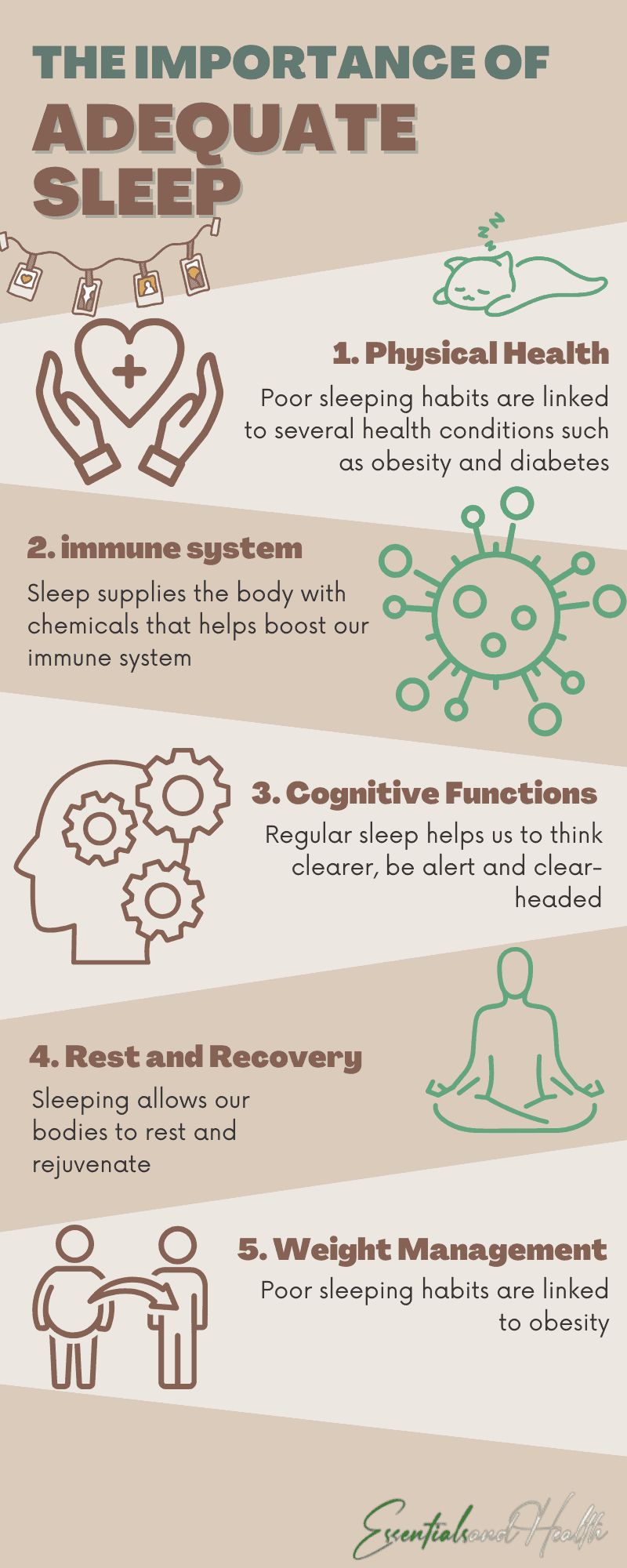Why Sleep Is So Important to Your Health
Our content is reader-supported. This means we’ll receive a small commission if you purchase through one of the product links. This helps support the website and allows us to continue creating blogs like this one. Thank you in advance for the support!
The Importance of Sleep
Sleep is one of those fundamental and often underestimated pillars of our well-being.
Our mind and body undergo the process of rejuvenation and repair during these peaceful hours of rest.
To give a few examples, sleep is crucial in maintaining physical health, cognitive health, and even longevity.
Let us explore together the transformative power of a good night’s rest and why it should be a priority:
Sleep helps with our Physical Health.
While sleeping, our blood pressure decreases, supplying our hearts and blood vessels with much-deserved rest.
The less rest we get, the longer our blood pressure stays up during a 24-hour cycle.
High blood pressure is a chronic disease that can lead to heart disease and stroke.
Inadequate rest can have profound consequences for our physical health and can lead to conditions including:
- Diabetes
- Obesity
- Heart problems
Sleeping strengthens our Immune System
During sleep, our bodies create proteins called cytokines, which strengthen our immune system and provide energy for our white blood cells.
Insufficient sleep diminishes the production of a crucial immune-boosting chemical, leaving us more susceptible to viral and bacterial attacks as our immune system weakens.
Better Physical Performance
Another benefit to getting good sleep is that it can help us improve our exercise performance.
Getting proper rest means simply that the different components in our brains can recover their energy to perform at their best.
This keeps the muscles and organ systems in sync with one another.
Getting adequate sleep regularly can therefore help improve our:
- Muscle strength
- Reaction times
Getting Sufficient Rest Increases Cognitive Functions
Studies show that sleep has links to several brain functions, including:
Memory: We are fresher and have greater ease when it comes to memory when we get a good night’s rest; insufficient sleep may affect memory processing and formation.
Performance: Sleeping well regularly allows us to be more alert and clear-headed.
Our performance in every setting is affected by sleep disruption.
This includes our focus, our emotions, our decision-making, our risk-taking behavior, and our judgment.
Cognition: During sleep, our body is working to support healthy brain functions. By affecting stress hormones, sleep disruption may affect understanding.
A recent finding associated being tired as one of the leading causes of fatal car crashes.
Sleeping Well Helps Keep Our Emotions in Check
Researchers found that the quality of our rest and our mood are closely related.
We’re better able to control our emotions and behavior when well-rested.
We tend to experience mood swings when we lack sleep, and children may have tantrums or trouble getting along with others under the same condition.
Sleep deficiency is also linked to depression, suicide, and risky behavior.
How much sleep is enough?
Adequate sleep is likely to vary and is also likely to be dependent on an individual’s age :
- Newborns (0-3 months): 14-17 hours
- Infants (4-11 months): 12-15 hours
- Toddlers (1-2 years): 11-14 hours
- Preschoolers (3-5): 10-13 hours
- School-age children (6-13): 9-11 hours
- Teenagers (14-17): 8-10 hours
- Younger adults (18-25): 7-9 hours
- Adults (26-64): 7-9 hours
- Older adults (65+): 7-8 hours
Source: The National Sleep Foundation
How do we improve our Sleep?
Have a bedtime routine: We must avoid bright lights, large meals, caffeine, and alcohol before bed. A nice hot bath, for example, can do the trick.
Manage your diet: Ensuring that we do not go to bed hungry or feeling overfull is also essential.
It is always a good practice to avoid eating large meals within a couple of hours of heading to bed, as this could cause discomfort and indigestion, which might keep us up.
Exercise during the day: This can help us unwind in the evenings and help us get good rest.
The Sleep Lean is a nutritional solution known to support improved nightly sleep.
Conclusion
We think it is important to stress that sleeping more than 9 hours a night regularly may do more harm than good.
For good practice, aim for 7-8 hours of slumber each night for peak health benefits.
In short, getting good rest equals good health.
A good day leads to a good night. A good night’s rest will help us have a good day.
How do you prioritize your rest?











